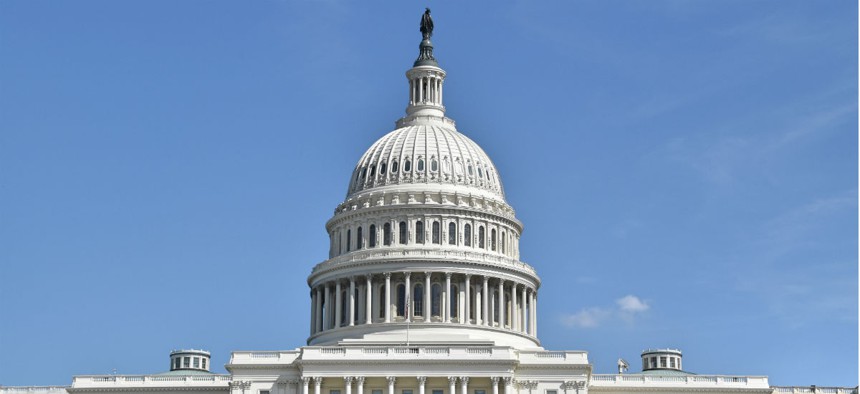
By Donald Walker / Shutterstock.com
Conference Committee Make-Up Could Favor Giving Feds a Pay Raise in 2019
A House aide described a proposed 1.9 percent pay increase next year as "a matter that is being negotiated."
As lawmakers on Capitol Hill negotiate what should be included in a minibus spending package for the Interior and Environment, Agriculture, Financial Services and other agencies beginning this week, they appear to be facing a close decision on whether civilian federal employees should receive a raise next year.
Last week, the House agreed by voice vote to send the $154.2 billion spending package (H.R. 6147), which also includes general government agencies, to conference. One of the differences between the House and Senate versions of the bill that must be ironed out is whether to provide federal workers with a 1.9 percent pay increase in 2019, or whether to effectively endorse President Trump’s planned pay freeze.
By the end of last week, both chambers had announced the lawmakers appointed to the conference committee. All senators, Republican and Democrat, voted for the Senate version of the bill, including a pay raise, while nearly half of House conferees have expressed support for the Senate plan.
Sen. James Lankford, R-Okla., chairman of the Senate Appropriations Committee’s Financial Services and General Government Subcommittee, last week reiterated his support for a 1.9 percent increase to civilian employees’ pay in 2019.
“The appropriations bill I authored would provide a 1.9 percent increase in federal employee pay, the same inflation-based increase provided last year,” Lankford said. “While the president’s announcement [of a pay freeze] was routine and expected, it will take effect unless Congress acts. As appropriators work with House and Senate leadership to finalize as many appropriations bills as possible before the September 30 deadline, I am hopeful we can ensure our federal workforce is adequately compensated for their important roles.”
A House Appropriations Committee aide said Monday that federal employee compensation “is a matter that is being negotiated” in conference committee. A look at the list of House conferees suggests a tight margin for lawmakers seeking to endorse Trump’s pay freeze.
All six of the House Democrats appointed to the negotiating team signed onto a letter last week urging congressional leaders to adopt the Senate’s pay raise proposal.
“It is hard to think of another group of Americans that has been asked to give more to reduce the national deficit,” the Democrats wrote, referring in part to a three-year pay freeze that occurred from 2011 through 2013. “We cannot continue to pretend to balance our budget on the backs of the people who process our Social Security checks, keep our airports secure, fight forest fires, promote public health and protect our homeland.”
And on the Republican side of the aisle, Rep. Tom Cole, R-La., joined a letter spearheaded by Rep. Scott Taylor, R-Va., urging Trump to reverse course on his pay freeze proposal.
“While we applaud efforts to be fiscally responsible, these scheduled pay raises are overdue for our hardworking federal employees and provide incentives to recruit and retain a strong federal workforce,” the Republican lawmakers wrote. “[We] urge you to reconsider cancelling the federal civilian employee pay raise set to go into effect January 2019. Our federal civilian workforce deserves this pay raise.”
That leaves eight Republicans–House Appropriations Committee Chairman Rodney Frelinghuysen, R-N.Y., and Reps. Robert Aderholt, R-Ala.; Mike Simpson, R-Idaho; Ken Calvert, R-Calif.; Mario Diaz-Balart, R-Fla.; Tom Graves, R-Ga.; David Young, R-Iowa; and John Rutherford, R-Neb.–potentially in opposition to a pay raise. None of these eight lawmakers have stated a public position on a potential pay raise.
In order for a conference committee to come to an agreement on a piece of legislation, a majority of the conferees from each chamber must vote to approve that agreement. That means eight of the House conferees must assent to a compromise. In other words, to approve a bill with a pay raise, at least one of the eight Republicans who has not yet expressed an opinion on the raise would need to agree to it.
Although Trump has pushed for a pay freeze since the White House first issued the proposal as part of the fiscal 2019 budget plan, he has seemingly wavered on whether to fight over that policy in recent days. Before Labor Day, he promised to “study” the issue after falsely suggesting employees had not received a raise “in a long time.”
Those comments came just 24 hours after the Trump administration issued an alternative pay plan formalizing the pay freeze proposal. If Congress does not act to overrule the White House, Trump has an opportunity to unilaterally institute a raise through the President’s Pay Agent in December.







